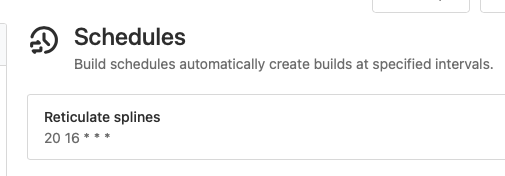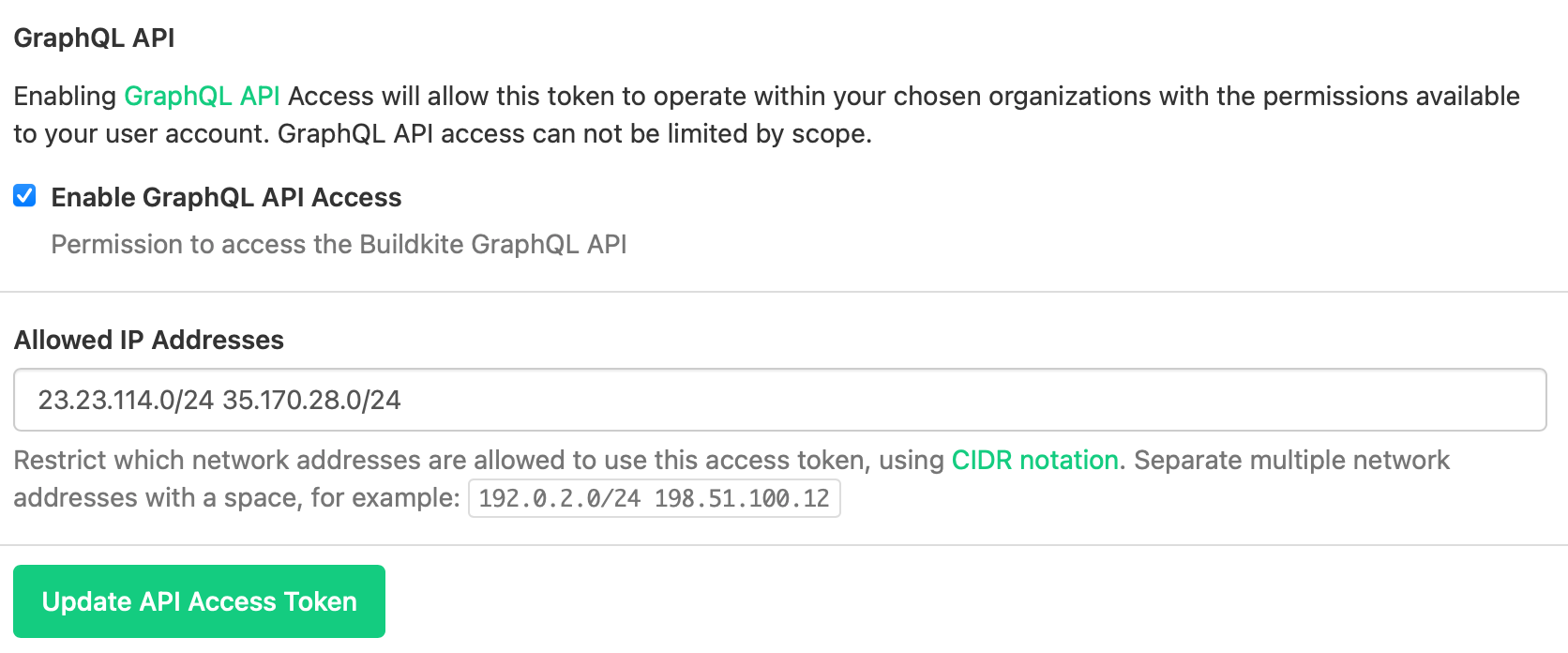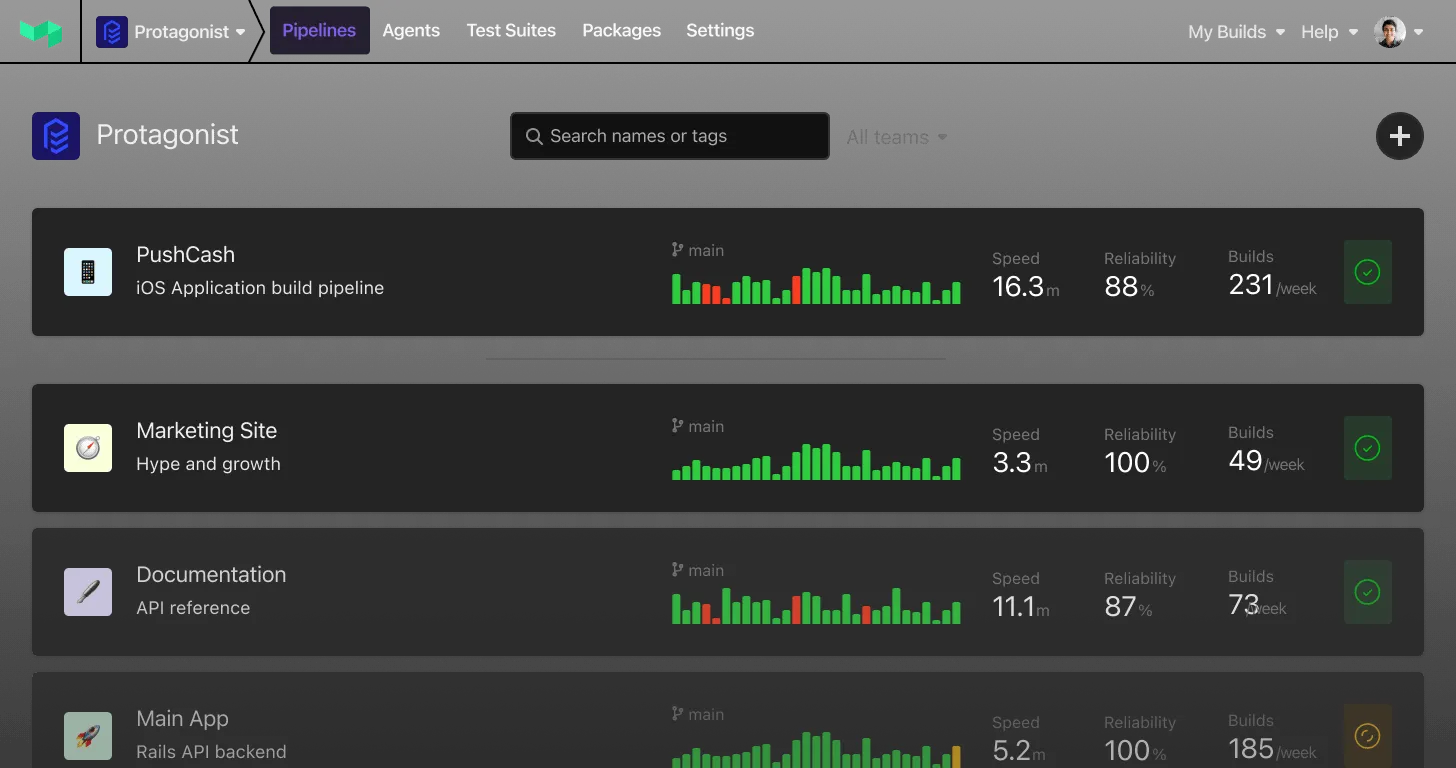New environment variable: Pull request draft
For customers triggering builds via GitHub, we've added a new environment variable to track the draft status of a pull request:
BUILDKITE_PULL_REQUEST_DRAFT="true"If a pull request triggers a build while in a draft state, this variable will be present in all the build's command jobs. The variable will be absent otherwise.
This variable allows customizing your uploaded pipelines or running jobs at the agent level based on a pull request's draft status. For example, you might run a faster subset of your tests while a pull request is still in a draft state.
Check out our docs on environment variables for more information.
If you have any feedback, we'd love to hear from you in our community Slack channel, or drop us an email to support@buildkite.com.
Samuel
Specify Team Access Levels in Create Pipelines API
Using the Create Pipeline REST API you can now specify the access level for each associated team 🔏

Previously, new pipelines could be created in teams, but only at the highest access level with the broadest permission. Now that access level can be varied to suit your pipeline and teams. This now matches the dashboard and GraphQL API.
Find out more in our docs about managing pipeline permissions with teams.
If you have any questions or feedback we'd love to hear from you in our community Slack channel, or drop us an email to support@buildkite.com.
Samuel
Automatic job expiration after 30 days
Starting August 1st 2022, jobs which are not run within 30 days will automatically expire 🧹
In the past, it's been very easy to have lingering jobs in your Buildkite account which are never assigned an agent, and will never run. Not only does this create unnecessary noise and risk within your account, but it means that Buildkite’s job processing logic needs to handle years-old jobs.
With this change, we've introduced a new job state: expired. This is similar to the canceled state, and once a job is transitioned to this state, the build will fail.
This will be enabled for everyone on Monday, 1st August 2022, but you can opt in today at an organisation level, or a per-pipeline level, to start testing and verifying that it works with your own builds. Once enabled, jobs older than 30 days that haven't been run by an agent will be automatically transitioned to expired and their builds cancelled. This new state will also appear in the REST and GraphQL APIs.
To enable this today, see the "Job Expiry" section in your organization's pipelines settings page, or each pipeline's Pipeline Settings > Builds page:

If you have any questions or feedback we'd love to hear from you in our community Slack channel, or drop us an email to support@buildkite.com.
Samuel
Improved Docs navigation bar
After releasing Test Analytics, we've been working on improving the navigation bar in the Docs to make it easier for you to find and read docs on both Pipelines and Test Analytics.

This change and other recent UI and UX improvements are already live in the docs.
Sam
Agent names no longer support "%n"
Using %n in agent names is deprecated and will soon be removed 👋
The default name for a Buildkite Agent used to be agent-%n, resulting in agent-1, agent-2, etc. Pretty quickly, though, this gets tricky to keep unique, especially with a big database full of agent names. So to keep our database humming, we're removing support for %n.
We began this process with Buildkite Agent v3.27.0 released on 8th February, 2021, removing %n from the default agent name. Elastic CI Stack for AWS v5.2.0 was also updated to replace usage of %n with %spawn on the same day.
If you're using Elastic CI Stack for AWS, please make sure you're running v5.2.0 or newer. The version you're using should be visible on your agents page:
 )
)
If you're running your agents another way, please review your agent configuration and confirm you're not using %n.
If you are using %n, there are a few alternatives:
- If you're running a single agent on each host, use
%hostname. - If you're running multiple agents, use the spawn option and
%hostname-%spawn. - If neither of the previous options work, use
%randomwhich will turn into a few random characters.
Check out our docs for a complete reference: https://buildkite.com/docs/agent/v3/configuration#name
We'll begin brownouts of %n on Monday, 8th August 2022. Finally, we'll remove support for %n on Monday, 5th September 2022. Agents which still use %n in their name after this date will fail to connect and accept work.
If you need some more time, or have a problem completing this migration, please drop us an email to support@buildkite.com.
Samuel
Filter busy agents
For teams that have a large number of connected agents, we’ve added a new filter to the Agents page so you can quickly find which ones are busy working on jobs 🕵️♀️🕵️♀️🕵️♀️

We hope this makes it easier to find and interact with agents which are running jobs in your organization.
If you have any feedback we'd love to hear from you in our community Slack channel, or drop us an email to support@buildkite.com.
Samuel
Buildkite Test Analytics: Identify, track, and fix problematic tests
We know how frustrating finding and fixing flaky tests can be. And how costly your test suite performance degradations can become over time. We’ve been working to solve these problems for good, with our newest product — Buildkite Test Analytics.
As of today, Test Analytics is out of beta and available to everyone 🎉
- Automatically identify flaky tests, see what is causing the most disruption for your team, and get a head-start on fixing them for good.
- Get deep visibility and tracing for your test suite, integrated with your programming language and test framework.
- Set targets and identify problems as soon as they occur with configurable speed and reliability monitors.
Test Analytics is included in all Buildkite plans and is free to get started. You can even use it with any CI system, including GitHub Actions, CircleCI, and Jenkins ⚡️
Read more on the website, in our documentation — and if you're super excited, retweet!
Michelle
Agent v3.36.1 + AWS Elastic Stack v5.9.0 Release
Buildkite Agent v3.36.1 and the AWS Elastic Stack v5.9.0 are now available! 🎉
This agent version ships with experimental support for tracing CI runs through OpenTelemetry, as well as improvements to logging, and an experimental file locking system that should unlock more reliably when the agent hasn't shut down cleanly.
This agent release has been added to the v5.9.0 release of the elastic stack, which also:
- Adds ability to fetch EC2 instance tags via Instance Metadata
- Updates the Linux Kernel on elastic stack instances from 4.14 to 5.10
- Adds an option to enable EC2 Detailed Instance Monitoring
For full list of additions, changes, and fixes, see the buildkite-agent changelog and the elastic-ci-stack-for-aws changelog on GitHub.
Benno
Pull request repository URL protocol
We're changing the $BUILDKITE_PULL_REQUEST_REPO environment variable value supplied for GitHub and GitHub Enterprise repositories from the unauthenticated git protocol to https 🔒
GitHub announced some time ago that they are removing the unauthenticated git protocol. This change has been in effect since 15th March 2022. Now we're modifying how we generate this environment variable to match their change.
$BUILDKITE_PULL_REQUEST_REPO is not used by the Buildkite Agent to clone your repositories. The value is only provided as a reference, and is particularly useful for pull requests from repository forks. Some customers use this value to ensure that pull requests from forks come from trusted sources, for example.
We recommend reviewing your agent hooks and making sure any security rules that utilise this value are adjusted to be agnostic to the protocol used, and are at least able to handle https.
From Monday, 20th June 2022, all new builds will use a https:// protocol URL for $BUILDKITE_PULL_REQUEST_REPO. If you need a little more time, or would like this change to take effect earlier for your organization, please reach out via support@buildkite.com.
Samuel
AWS Elastic Stack v5.8.0 release
The 5.8.0 version of the AWS elastic stack is now available. 🚀
This release added:
- Ability to customise docker address pools to use more, slightly smaller networks rather than a few big ones
- Support for additional ARM/Graviton instance types: c7g, g5g, lm4gn, lm4gen, and x2gd
- SecretsBucketRegion parameter and updated s3secrets-hooks
- Docs on updating the different components #957 (@keithduncan)
It also fixed:
- Overwrite /usr/bin/buildkite-agent symlink if it already exists
For full list of additions, changes, and fixes, see the elastic-ci-stack-for-aws changelog on GitHub.
Libby
Agent v3.35.0 release
The 3.35.0 version of the buildkite-agent is now available. 🚀
This release has added:
- An option to skip updating the mirror when using git mirrors. Useful when git is mounted from an external volume
- The more secure SHA256 hashing algorithm alongside SHA1 when working with artifacts
- Additional security when creating directories, making them only accessible by current user and group
For full list of additions, changes, and fixes, see the buildkite-agent changelog on GitHub.
Libby
Schedules no longer have a user
As announced in 2019, Schedules no longer need a user 🏃🏼♂️💨
Schedules created before then and not manually migrated have now had their build ownership user removed. Builds created from those schedules will no longer have a creator, which may affect trigger step permission, build.creator conditionals, and $BUILDKITE_BUILD_CREATOR environment variable checks.

Schedules created since the 2019 announcement are unaffected, as they never had a build ownership user.
Paul
Build Matrix for Multi-step Pipelines
We've added Build Matrix so you can create multiple jobs from a single, multi-variant step definition. 🧮
Build Matrices can also include multiple dimensions, different combinations with the adjustments key, and matrix jobs can be grouped together to clean up build pages. ⚡️
Read more about it in the blog, documentation, or on Twitter.
Libby
Agent v3.34.0 release
The 3.34.0 version of the buildkite-agent is now available. 🚀
This release has added:
- a new combination flag: spawn-with-priority
- locked down file permissions on Windows
- increased security by rejecting pipeline uploads containing redacted vars
For full list of additions, changes, and fixes, see the buildkite-agent changelog on GitHub.
Libby
Group steps with the `group` config option
We've added a new group pipeline step type so you can group steps together, set dependencies between them, reduce YAML repetition, and clean up your build pages 🏗✨
You can read more about it in the blog post, documentation, or on Twitter.
Libby
GraphQL API Allowed IP Addresses
API Access Tokens can be restricted to allow access only from specific Allowed IP Addresses. Those restrictions have been honoured by the REST API, but not by the GraphQL API — until now. We've made sure these restrictions are also applied to GraphQL requests.

Check out the API Access Token documentation and configure your tokens on the API Access Tokens page.
Samuel
Buildkite and Log4j CVE-2021-44228
Last week a serious vulnerability, CVE-2021-44228, was disclosed in the Java-based logging package Log4j. We’ve ensured that Buildkite internal systems, and our open source projects, are not vulnerable to this exploit.
We've performed an audit on our internal software and infrastructure, and we have no instances of Log4j in use directly or via dependencies, and therefore are not vulnerable to this exploit. Additionally we've reviewed our open source projects (including the Buildkite Agent and the Elastic CI Stack for AWS) and have verified they also don't have any use of Log4j and are not vulnerable to CVE-2021-44228.
We use a number of services from AWS and other cloud vendors, and are actively monitoring them to validate that they are not vulnerable and take any necessary mitigation.
If you haven't already, we also recommend updating any use of Log4j within your own build tooling.
If you have any further questions please contact support@buildkite.com.
Fred
AWS Elastic Stack v5.7.2 release
The 5.7.2 version of the AWS elastic stack is now available. 🚀
This release includes:
- Upgrade Docker for Linux (20.10.9) and Windows (20.10.7)
- Upgrade docker-compose for Linux (1.29.2) and Windows (1.29.2)
It also fixes:
BuildkiteAgentTokenParameterStorePathsupport for AWS Secrets Manager SSM references
For full list of additions, changes, and fixes, see the elastic-ci-stack-for-aws changelog on GitHub.
Libby
Datadog CI Visibility Integration
For teams using Datadog, we've recently made it easier to send information about your Buildkite pipelines to Datadog’s Continuous Integration Visibility. This is a simple integration that any organization using both Datadog and Buildkite can enable to get insights into their pipeline’s performance over time. 📈
For more details on the integration check out the documentation 📚
Libby
Elastic CI Stack for EC2 Mac
For teams that run Buildkite Pipelines and build Xcode based software projects for macOS, iOS, iPadOS, tvOS, and watchOS apps, you can now run your Buildkite Builds on AWS EC2 Mac instances using a CloudFormation template. 🎉
This experimental template creates an Auto Scaling group, launch template, and host resource group to launch a pool of EC2 Mac instances that run the Buildkite Agent.
📣 Big shoutout to Buildkite customer Oliver Koo for his early input into this feature 🙏
📚 For details on how to prepare and deploy this template to your AWS Account, checkout the Auto Scaling EC2 Mac documentation, or jump straight into Elastic CI Stack for EC2 Mac.
Libby
Start turning complexity into an advantage
Create an account to get started with a 30-day free trial. No credit card required.

